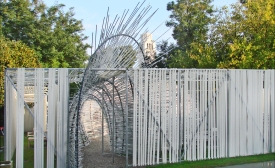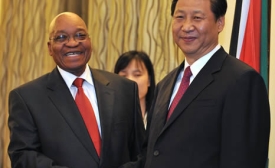angola

Nicholas Cull, Professor of Public Diplomacy and Director of the USC Master of Public Diplomacy program, explores the interplay of cultural heritage and global engagement at the biannual Venice Biennale of Architecture.
China’s increasing involvement in Africa has captured considerable attention from policymakers and academics. Formalized in a 2006 policy statement, “China’s Africa Policy,” Beijing’s interest in the region translates into Chinese government and government-affiliated institutions investing billions of dollars in large-scale construction projects across the continent.

A review of Howard French's book: China’s Second Continent: How a Million Migrants Are Building a New Empire in Africa.
Brazil has offered Angola a new credit line worth $2 billion for use in the sub-Saharan African country's energy and construction sectors, Angolan Finance Minister Armando Manuel said on Monday.
CPD announces the 10 most significant public diplomacy stories of 2013 as part of its review of global trends that are shaping the field. To narrow our list of 1,500 stories to 50, we took into account the following factors: the frequency of the story being covered in various news sources, the implications of the public diplomacy event, the credibility of sources publishing the news about the PD moment, and the frequency of an actor’s participation in public diplomacy activities either as the initiator or receiver of public diplomacy.
Rarely covered in the English-speaking press because of its past as a Portuguese colony, the behavior of the government in Angola is becoming increasingly troubling. Crony capitalism isn't rare on the African continent—or indeed anywhere else in the world—but Angola's iteration is particularly extreme. Following a civil war that ran on and off from the nation's independence from Portugal in 1975 all the way to 2002, Angola’s elite—overseen by 71-year old President José Eduardo dos Santos—has fed greedily at a trough of oil and gas.
The Angolan government should immediately end arbitrary arrests and assaults against peaceful protesters and journalists, Human Rights Watch said today. All those held for exercising their rights to assembly and expression should be released unless they are promptly charged with a credible criminal offense.







